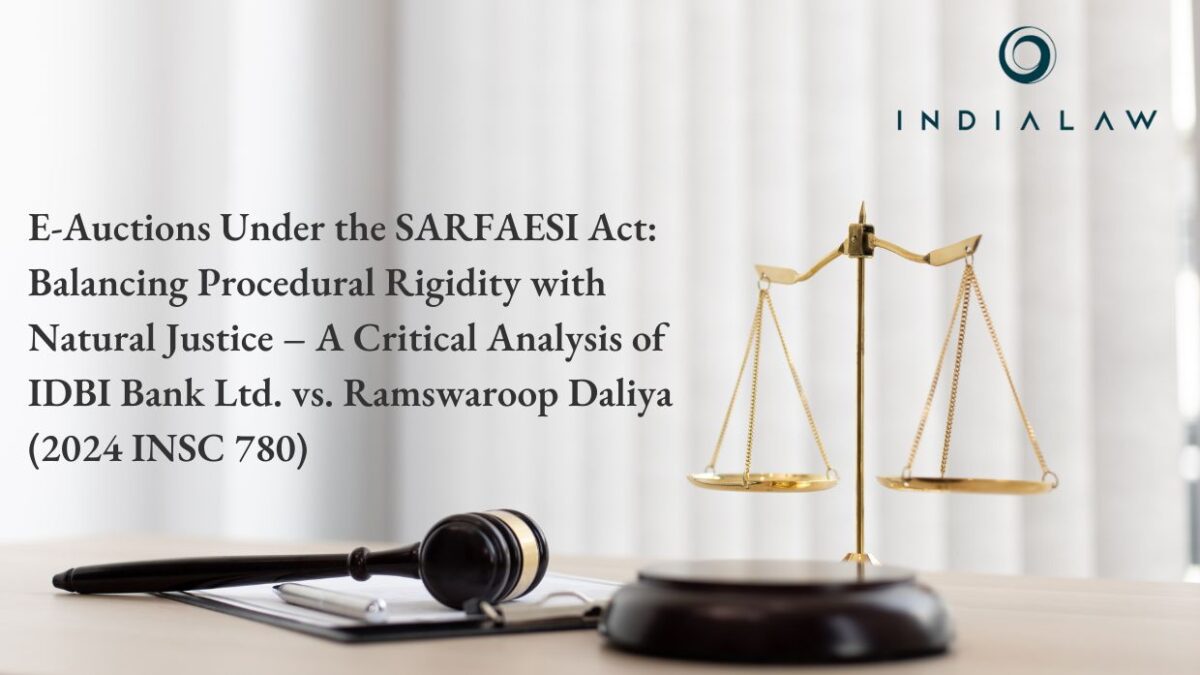E-Auctions Under the SARFAESI Act: Balancing Procedural Rigidity with Natural Justice – A Critical Analysis of IDBI Bank Ltd. vs. Ramswaroop Daliya (2024 INSC 780)


The Supreme Court of India’s judgment in IDBI Bank Ltd. vs. Ramswaroop Daliya and Ors. (2024 INSC 780) revolves around a dispute concerning an e-auction sale of property under the provisions of the SARFAESI Act, 2002 and the Security Interest (Enforcement) Rules, 2002. The Supreme Court ruled in favor of the respondent-auction purchasers, holding that cancellation of the auction sale could only be justified if the purchaser defaulted in paying the remaining auction amount. The Court further clarified that the statutory 15-day deposit period is not rigid and may be extended through mutual agreement.
Table of Contents
Case Summary
Background
1. Auction & Initial Payment
- IDBI Bank conducted an e-auction on April 10, 2018, for a plot of land in Telangana.
- The respondents, who emerged as the highest bidders, paid 25% of the bid amount (₹36,00,000) on the same day, as required under the auction rules.
2. Issues with Sale Completion
- Despite the auction confirmation, the bank did not finalize the sale due to external complications, including:
- A complaint to the CBI.
- An advisory from the Enforcement Directorate (ED) instructing the bank to keep the property documents in safe custody.
- Meanwhile, the auction purchasers expressed their readiness to pay the balance amount of ₹1,06,50,000. They submitted a bank draft and formally requested the issuance of the sale certificate and possession of the property.
- However, the bank refused to proceed, arguing that the purchasers failed to deposit the remaining amount within the 15-day window. On December 24, 2019, the bank cancelled the auction unilaterally and refunded the initial deposit, without giving the auction purchasers an opportunity to be heard.
3. Auction Purchaser’s Legal Action
- Aggrieved by the cancellation, the respondents filed a writ petition before the Telangana High Court, seeking an order directing the bank to issue the sale certificate and complete the sale process.
High Court’s Decision
The Telangana High Court ruled in favour of the respondents, holding that the bank acted unjustly in unilaterally cancelling the auction. The court found that the auction purchasers were ready and willing to pay the remaining amount, and directed the bank to issue the sale certificate.
Supreme Court’s Judgment
1. No Default by the Respondents
- The Supreme Court held that the respondents were not at fault for failing to pay the remaining amount. The non-completion of the sale was caused by the bank’s refusal to accept payment, driven by external factors such as the CBI complaint and ED advisory.
2. Invalid Cancellation of the Auction
- The Court ruled that the bank’s unilateral cancellation of the auction without granting the purchasers a hearing violated the principles of natural justice.
3. 15-Day Deposit Period Not Mandatory
- The Court clarified that Rule 9(4) of the Security Interest (Enforcement) Rules, 2002 allows the 15-day payment period to be extended by mutual consent between the bank and the auction purchaser.
4. Bank’s Technical Arguments Rejected
- The Court dismissed the bank’s reliance on technicalities, emphasizing that Rule 9(4) did not apply in situations where the auction purchaser was not in default.
5. Judgment Affirmed
- The Supreme Court upheld the Telangana High Court’s decision, directing the bank to issue the sale certificate and execute the sale deed. The Court also ordered the bank to accept the remaining payment within four weeks.
Conclusion
The Supreme Court’s judgment underscores that cancellation of an auction sale can only be triggered by the purchaser’s default in making the remaining payment. It reaffirmed that the 15-day deposit period is not rigid but is instead directory, allowing for flexibility through mutual consent. The ruling provides much-needed clarity on auction procedures under the SARFAESI Act and reinforces the principles of natural justice by ensuring fair treatment of auction purchasers.




